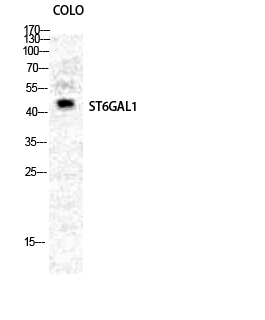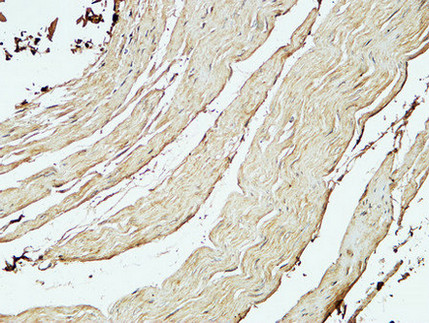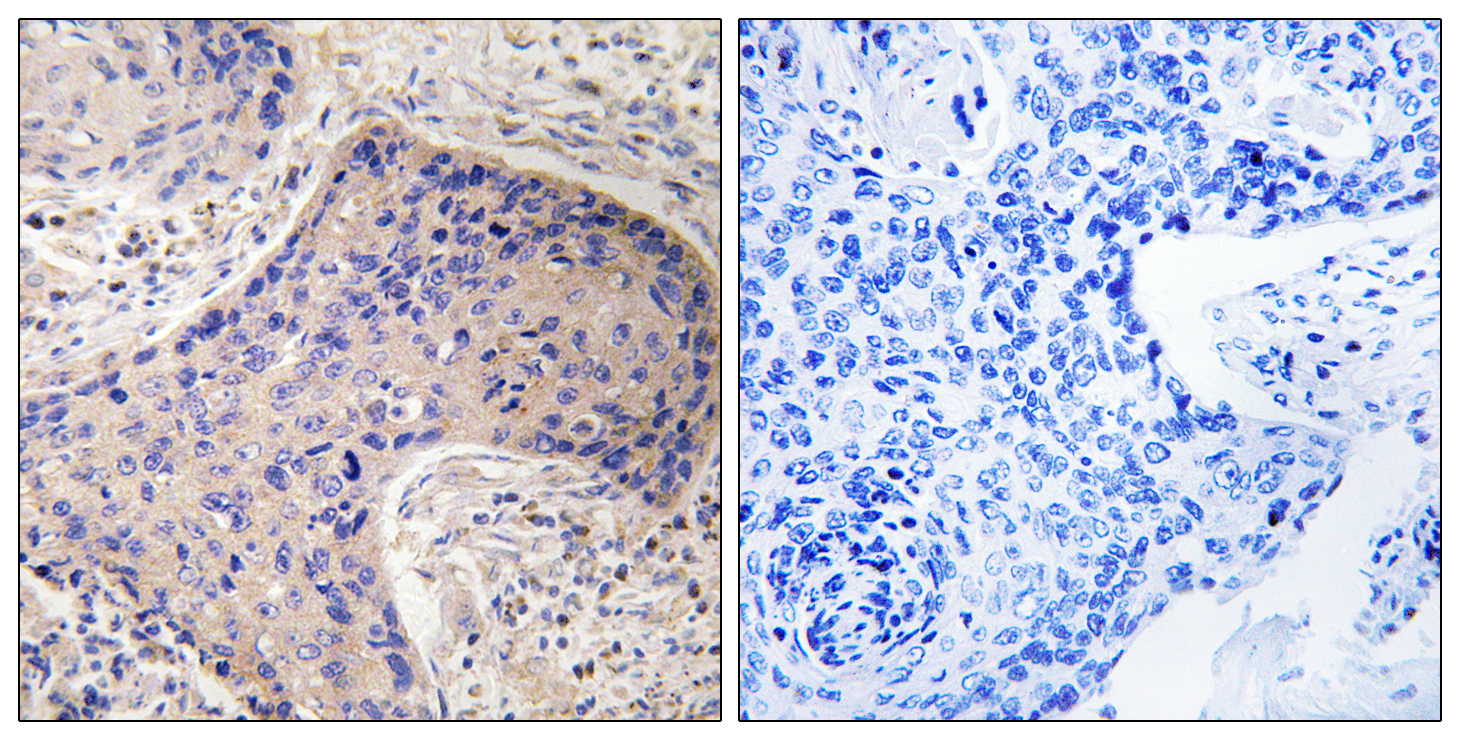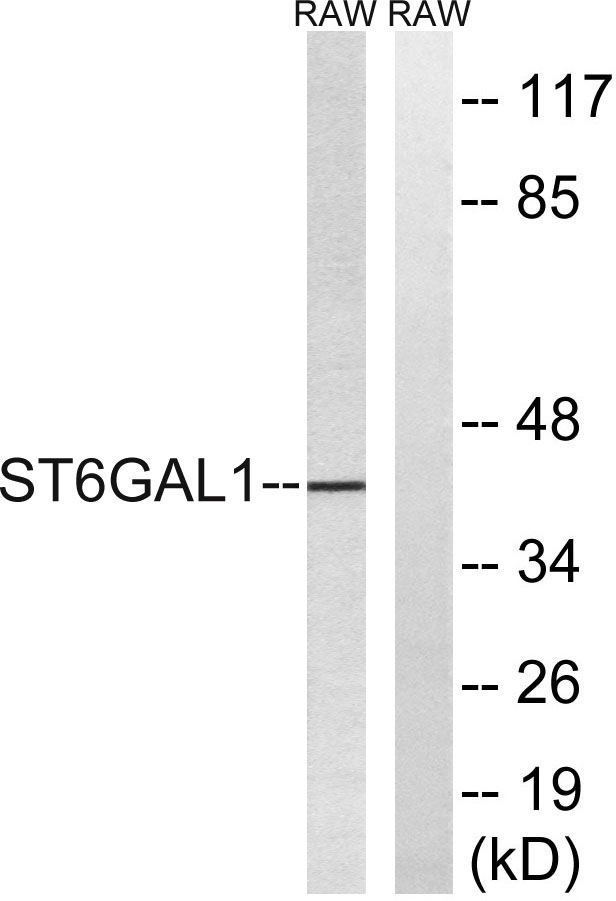CD75 Polyclonal Antibody
- Catalog No.:YT0776
- Applications:WB;IHC;IF;ELISA
- Reactivity:Human;Mouse;Rat
- Target:
- ST6GAL1
- Fields:
- >>N-Glycan biosynthesis;>>Other types of O-glycan biosynthesis;>>Metabolic pathways
- Gene Name:
- ST6GAL1
- Protein Name:
- Beta-galactoside alpha-2,6-sialyltransferase 1
- Human Gene Id:
- 6480
- Human Swiss Prot No:
- P15907
- Mouse Gene Id:
- 20440
- Mouse Swiss Prot No:
- Q64685
- Rat Gene Id:
- 25197
- Rat Swiss Prot No:
- P13721
- Immunogen:
- The antiserum was produced against synthesized peptide derived from human ST6GAL1. AA range:171-220
- Specificity:
- CD75 Polyclonal Antibody detects endogenous levels of CD75 protein.
- Formulation:
- Liquid in PBS containing 50% glycerol, 0.5% BSA and 0.02% sodium azide.
- Source:
- Polyclonal, Rabbit,IgG
- Dilution:
- WB 1:500 - 1:2000. IHC 1:100 - 1:300. ELISA: 1:40000.. IF 1:50-200
- Purification:
- The antibody was affinity-purified from rabbit antiserum by affinity-chromatography using epitope-specific immunogen.
- Concentration:
- 1 mg/ml
- Storage Stability:
- -15°C to -25°C/1 year(Do not lower than -25°C)
- Other Name:
- ST6GAL1;SIAT1;Beta-galactoside alpha-2;6-sialyltransferase 1;Alpha 2,6-ST 1;B-cell antigen CD75;CMP-N-acetylneuraminate-beta-galactosamide-alpha-2,6-sialyltransferase 1;ST6Gal I;ST6GalI;Sialyltransferase 1
- Observed Band(KD):
- 42kD
- Background:
- This gene encodes a member of glycosyltransferase family 29. The encoded protein is a type II membrane protein that catalyzes the transfer of sialic acid from CMP-sialic acid to galactose-containing substrates. The protein, which is normally found in the Golgi but can be proteolytically processed to a soluble form, is involved in the generation of the cell-surface carbohydrate determinants and differentiation antigens HB-6, CD75, and CD76. This gene has been incorrectly referred to as CD75. Three transcript variants encoding two different isoforms have been described. [provided by RefSeq, Aug 2009],
- Function:
- catalytic activity:CMP-N-acetylneuraminate + beta-D-galactosyl-1,4-N-acetyl-beta-D-glucosamine = CMP + alpha-N-acetylneuraminyl-2,6-beta-D-galactosyl-1,4-N-acetyl-beta-D-glucosamine.,function:Transfers sialic acid from the donor of substrate CMP-sialic acid to galactose containing acceptor substrates.,online information:GlycoGene database,online information:ST6Gal I,pathway:Protein modification; protein glycosylation.,PTM:The HB-6, CDW75, and CD76 differentiation antigens are cell-surface carbohydrate determinants generated by this enzyme.,PTM:The soluble form derives from the membrane form by proteolytic processing.,similarity:Belongs to the glycosyltransferase 29 family.,subcellular location:Membrane-bound form in trans cisternae of Golgi. Secreted into the body fluid.,
- Subcellular Location:
- Golgi apparatus, Golgi stack membrane ; Single-pass type II membrane protein . Secreted. Membrane-bound form in trans cisternae of Golgi. Secreted into the body fluid.
- Expression:
- Liver,Lymph,Placenta,Skin,Spleen,Thymus,
- June 19-2018
- WESTERN IMMUNOBLOTTING PROTOCOL
- June 19-2018
- IMMUNOHISTOCHEMISTRY-PARAFFIN PROTOCOL
- June 19-2018
- IMMUNOFLUORESCENCE PROTOCOL
- September 08-2020
- FLOW-CYTOMEYRT-PROTOCOL
- May 20-2022
- Cell-Based ELISA│解您多样本WB检测之困扰
- July 13-2018
- CELL-BASED-ELISA-PROTOCOL-FOR-ACETYL-PROTEIN
- July 13-2018
- CELL-BASED-ELISA-PROTOCOL-FOR-PHOSPHO-PROTEIN
- July 13-2018
- Antibody-FAQs
- Products Images

- Western Blot analysis of COLO cells using CD75 Polyclonal Antibody diluted at 1:2000

- Immunohistochemical analysis of paraffin-embedded Human stomach. 1, Antibody was diluted at 1:200(4° overnight). 2, High-pressure and temperature EDTA, pH8.0 was used for antigen retrieval. 3,Secondary antibody was diluted at 1:200(room temperature, 30min).

- Immunohistochemistry analysis of paraffin-embedded human prostate carcinoma tissue, using ST6GAL1 Antibody. The picture on the right is blocked with the synthesized peptide.

- Western blot analysis of lysates from RAW264.7 cells, using ST6GAL1 Antibody. The lane on the right is blocked with the synthesized peptide.



